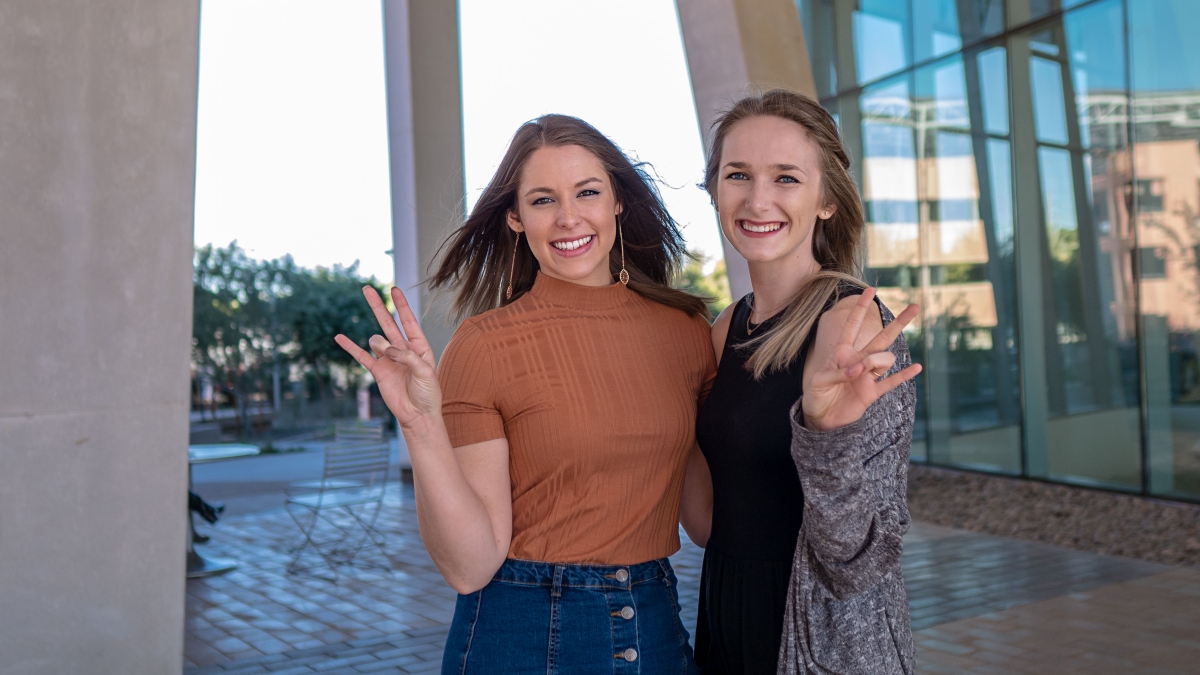Fighting against teen suicide

Madison Sutton (left) and Sonia Sabrowsky decided they had to do something to try to prevent teen suicide. Photo by Robert Ewing/ASU
Just two years ago, 31 teenagers died by suicide in the East Valley. Teen suicide is not just localized to large cities like Phoenix; it is a problem throughout Arizona and nationally. In 2017 alone, 1.3 million people attempted suicide and almost 50,000 died by suicide. For people of all ages, suicide is the 10th leading cause of death, but for teenagers, it is the second.
Arizona State University students Sonia Sabrowsky and Madison Sutton, both seniors in the Department of Psychology and Barrett, The Honors College decided they had to do something to try to prevent teen suicide.
Their motivation is personal. When Sabrowsky and Sutton were in high school, a friend died by suicide.
Both women are members of ASU’s Courage Lab and the ASU Tillman Scholars Program. The Tillman Scholars Program is a community of high achieving students, alumni and mentors who espouse the values and actions of Pat Tillman. They were encouraged to come up with a social venture designed to make a difference.
Together, they founded the Home Base Initiative, a nonprofit that provides mental health resources for students, parents and educators. Sabrowsky and Sutton’s initiative uses evidence-based interventions to promote better coping strategies for people suffering from suicidal thoughts. The Home Base Initiative is also in the process of creating a community-based peer support network for high school students.
“There are a lot of people who have been affected by teen suicide,” Sutton said. “Sonia and I wanted to make sure there were resources available for those at risk.”
Armando Pina, associate professor of psychology and director of ASU’s Courage Lab, and psychology graduate student Ryan Stoll helped mentor Sutton and Sabrowsky. Together, they identified evidence-based interventions. The next step for the Home Base Initiative is to design a program for Arizona high schools.
“The rate of suicide that we would want, is zero,” Pina said. “Young students should really not be thinking about ending their lives.”
Sutton and Sabrowsy set up the Home Base Initiative as a free resource guide with content specifically geared toward students, parents and educators. The initiative’s website has sections for each group that discuss how to support someone at risk for suicide and how to use evidence-based coping mechanisms for improved self-care.
“Though programs often address clinical risk factors such as depression and anxiety, the social risk factors of suicide, such as feelings of isolation, burdensomeness, and a lack of a tightly networked school community, are often overlooked, so we looked at how we could best support students who might have not been diagnosed as at risk for suicide,” Sutton said.
If you or someone you know is in crisis, call the toll-free National Suicide Prevention Lifeline, 1-800-273-TALK (8255), available 24 hours a day, seven days a week to anyone. All calls are confidential. Additionally, resources are available for ASU students with confidential professional counseling on campus.
More Science and technology

ASU and Deca Technologies selected to lead $100M SHIELD USA project to strengthen U.S. semiconductor packaging capabilities
The National Institute of Standards and Technology — part of the U.S. Department of Commerce — announced today that it plans to…

From food crops to cancer clinics: Lessons in extermination resistance
Just as crop-devouring insects evolve to resist pesticides, cancer cells can increase their lethality by developing resistance to…

ASU professor wins NIH Director’s New Innovator Award for research linking gene function to brain structure
Life experiences alter us in many ways, including how we act and our mental and physical health. What we go through can even…